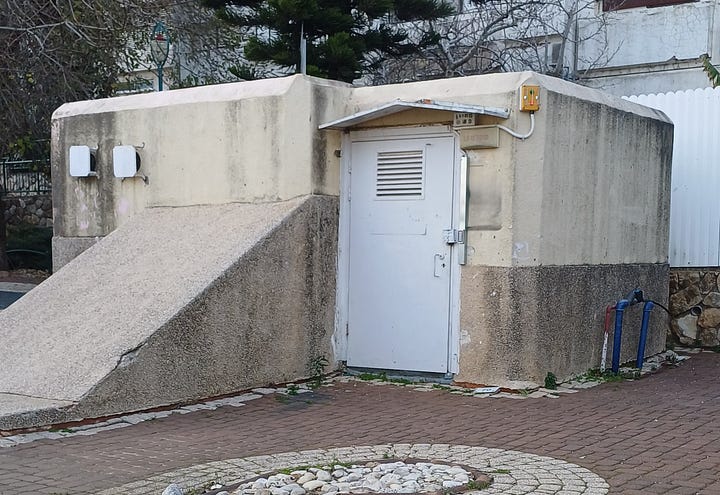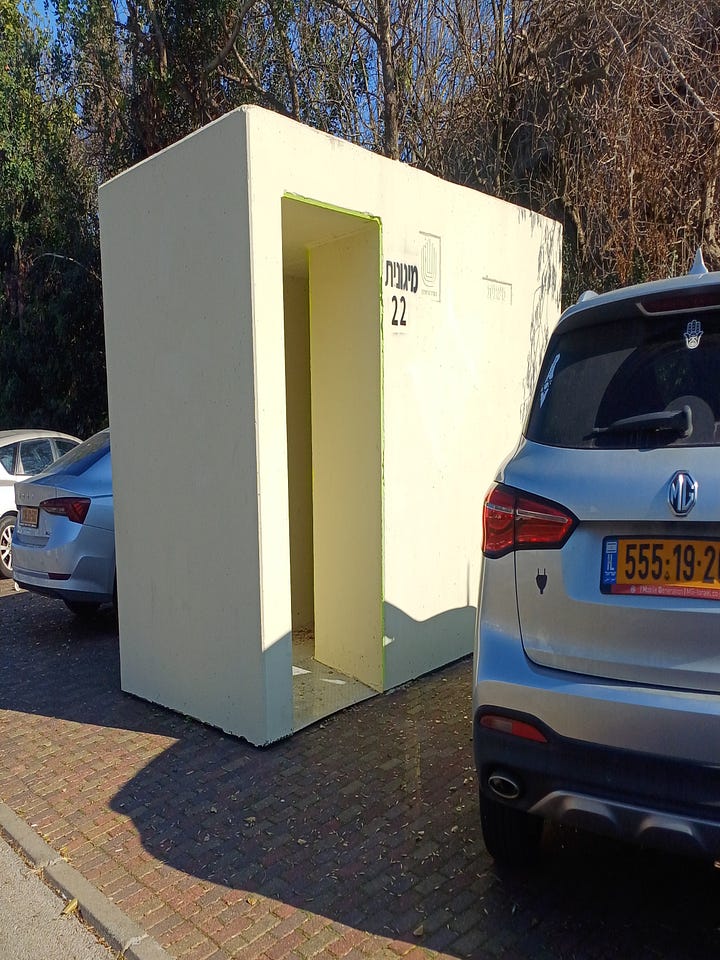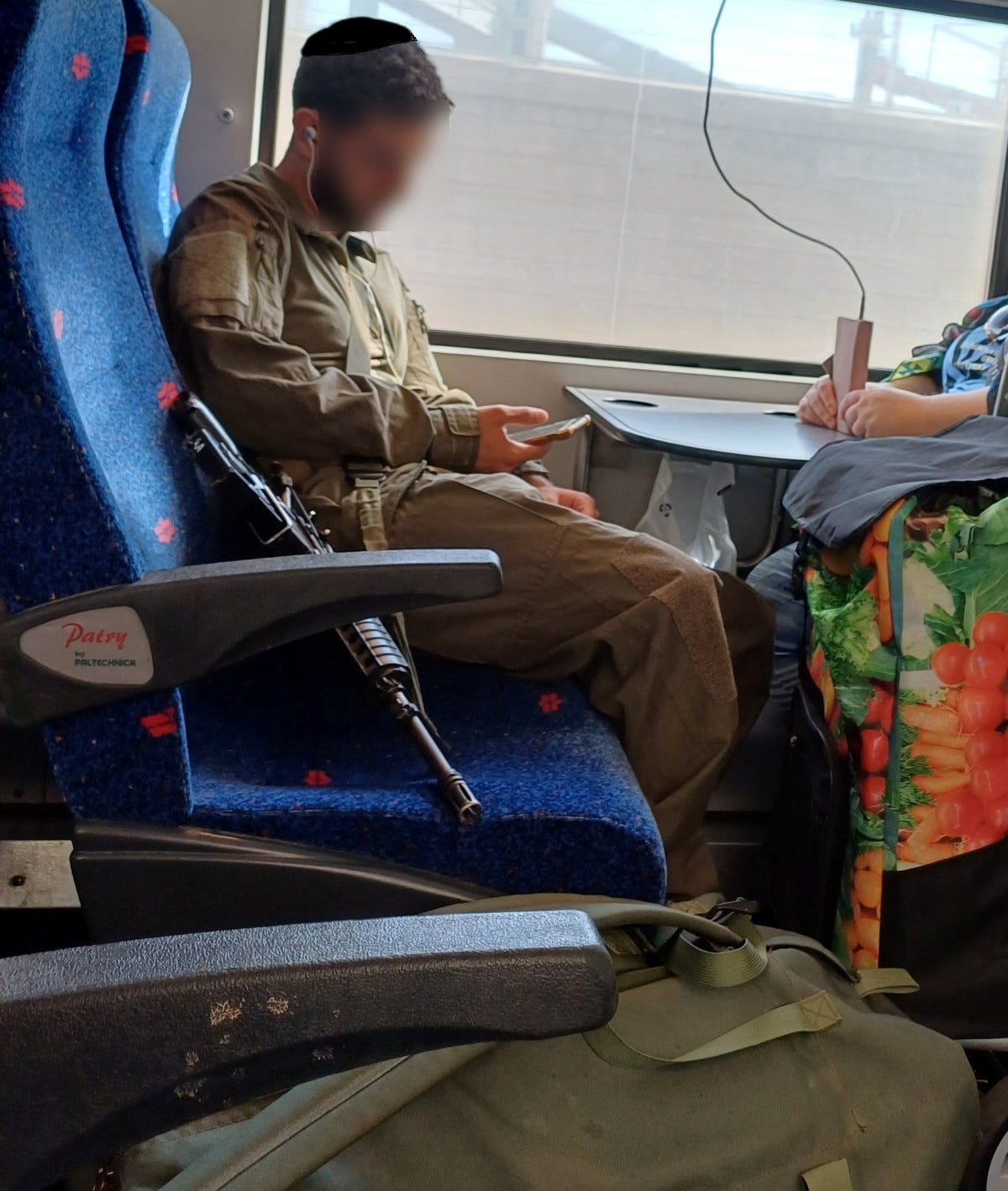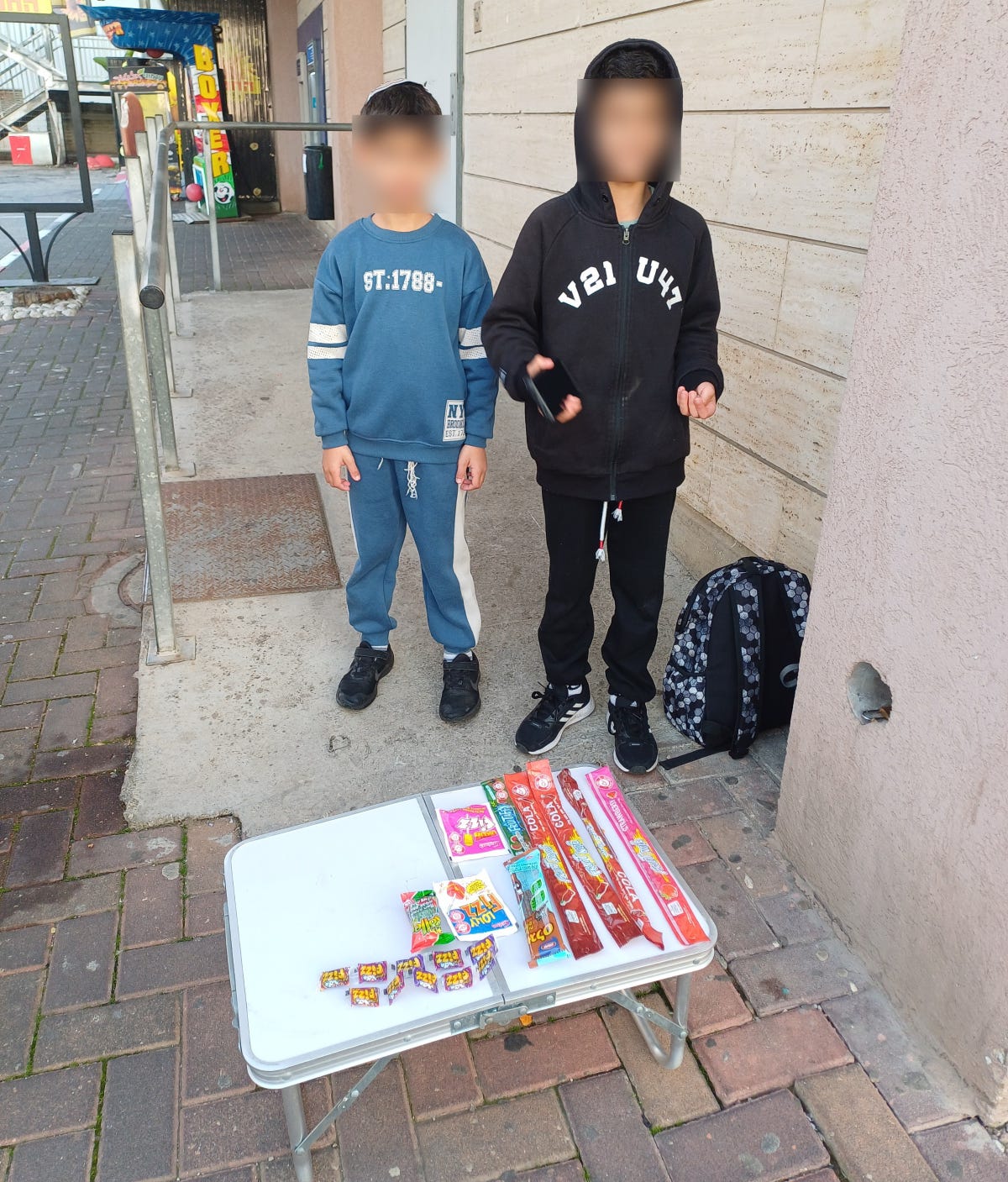Socks for Soldiers
A story for children 7-9 years, based on a true story about Israeli children and the war
Rafi sat on the low wall around the schoolyard. His eyes followed the soccer ball as other boys kicked it around the field. But he didn’t want to play.
He worried about Abba. For a very long time Abba had not stood in front of his classroom. He had not taught Torah to the boys in Rafi’s school. He had not been home to play with Rafi’s little sisters or to kick a soccer ball with Rafi and his younger brother, Shuki.
Instead, he wore a uniform and carried a gun. And far away in the south, he fought the bad guys who had attacked their country.
After many weeks, Abba had been home for Shabbat—just Shabbat, yesterday. Imma always finished her chores early on Fridays, but Abba had come home very late, close to when Shabbat began. Imma put his laundry in the washing machine as soon as he got home, but there wasn’t time for it to dry completely before Shabbat began. Even after Shabbat came in, Rafi could hear the clothes dryer turning, turning, turning.
This morning he had taken the earliest train to return to the army so he could fight to protect Israel.
Boom, boom-boom-boom. Rafi looked up to the sky when he heard the distant booms. He knew that the booms meant their army was protecting them. Abba had said not to worry unless there was a siren. But even so, Rafi shrank down, pulling his shoulders up as close to his ears as possible. Then he glanced over his shoulder. Could he run to the shelter quickly enough if the siren shrieked that a missile was coming? But this time there was no siren.


Rafi shook his shoulders out and took three deep, slow breaths, the way his teacher had showed them. He kicked the wall and thought about socks. Abba said that the soldiers needed lots of warm socks. When it rained, their feet got wet. It took a long time for socks to dry in the cold tents where they slept.
What could Rafi do? His elbows rested on his knees. His chin was in his hands as he thought and thought. Abba said it was the job of grownups to protect the people. He was only eight years old. What could a kid do to help?
“Rafi?”
Rafi looked up. Itay, who sat beside him in class, held out a half-empty bag of fruity candies. “You okay? Take one,” he said.
Rafi took a gummy banana. Chewing slowly, he enjoyed the sweet, fruity taste.
Suddenly he had an idea.
“Itay, your uncle is in the army now, like Abba, right?”
Itay nodded.
“Do you ever want to do something to help him and the other soldiers?”
Itay tipped his head and wrinkled his forehead. Then he straightened. “Do you think we could?”
“I didn’t think so. But the candy gave me an idea. You know the place by the supermarket where big boys sell stuff before the holidays? Right by the temporary bomb shelter? We could put a table there and sell candy. Then we can use the money we earn to buy lots of socks. Grown-up socks, for my father, your uncle, and the other soldiers. The next time your uncle or my father comes home on leave, we will have a big box for them to take back. The socks will make the soldiers happy. Maybe that will help them win this war faster and come home sooner.”
Itay’s eyes got big. He nodded slowly, then faster. “My big sister makes cards for her friends, and my little sisters like to help. They could make thank-you cards that we can include!”
Rafi jumped up and high-fived his friend. “Let’s do it!”
But then Itay bit his lip. “But how will we buy candy to sell?”
Rafi scratched his head, then straightened his yarmulke. “Umm—I guess we could save the treats that our mothers pack in our lunches.”
Itay thought another moment. He bit his lip. “That means we don’t eat them.” His sigh then was so big, Rafi saw his shoulders go way up, then down. Then Itay nodded. “I can’t think of anything else. Let’s.”
“I got this table from my big sister’s room,” Itay told Rafi the next week. “It’s low, but we can’t carry a big table down there.”
“It will work,” Rafi agreed. Itay tucked the table under his arm while his sack of candy swung from his other arm.
“I’m coming too,” said Shuki. He swung his sack of candy. “I want to help.”
As Shuki and Itay set up the table, Rafi approached a friendly-looking woman. “Do you want to buy some candy?” he asked with a smile.
“I don’t eat candy,” she said sadly, shaking her head.
“Will you contribute instead?” Rafi tipped his head and looked as sweet as he could—the smile that always worked on his grandma.
“Contribute to what?” she asked.
Rafi straightened up, as tall as he could. “We are selling candy to raise money to buy socks for the soldiers.”
“Why do they need socks?” asked the woman.
“Their socks get wet in the rain, and they don’t dry quickly in their tents. So they need extras,” piped up Itay.
Shuki nodded. “My Abba says that cold, wet feet make everything hard.”
The lady nodded. “I can see that.” She opened her purse and took out a 5-shekel coin. “You’re sure you won’t spend this on more candy?”
“We might use it to buy more candy,” said Itay. “My Abba says it takes money to make money. But you mean will we really buy socks with the money? Yes indeed!”
“My father and his uncle are in the Reserves. They only come home once in a while. We need to help them win the war. Then they can come home and stay home,” added Rafi.
As soon as the lady handed them the coin and walked away, two of the biggest boys from their school came over. Shuki looked quickly from them to Rafi and Itay. Were
“We heard you,” said the bigger boy. “Are you really raising money for socks for the soldiers?”
Rafi took a deep breath. What could they possibly want? “Yes,” he said.
“We think we should make this a school project,” said the second boy. “We should all help. My big brother is stationed up in the north. He complained to our mother about his feet. He said he needed extra socks, too.” He looked down and twisted his own foot on the pavement. “It didn’t even occur to me to help.” Then he looked at his friend. “We’ll go to the head of the school and talk to him. Meanwhile, good luck!”
The big boys ran off, and Rafi approached another person. Their plan was going to work, even better than they had expected. Even though they were not even bar mitzvah age,1 they could still help the soldiers fight and win the war.
For Parents, Teachers, and Others
Outside of Israel’s War for Independence, which lasted 598 days, the current Hamas war is the longest, at this writing on January 13, 2025, 464 days long. Everyone has been affected. Israel’s army has been called a “citizen’s army” because the vast majority of soldiers are men and women who completed their regular army service and returned to daily life. They are sons, daughters, mothers, fathers, and even some grandparents. They have ordinary jobs as factory and farm workers, shopkeepers, insurance agents, government workers, and lawyers, Many doctors have been drafted into the medical corps and, while still completing their normal hospital work, must also be available day and night for emergencies.
With so many people doing active service, businesses and especially farms, dependent as they are on help at very specific times, have suffered. Now that there is a ceasefire in the north, many soldiers have been sent home. Last week it was announced that for the first time in almost 1.5 years, Israel is selling local tomatoes rather than having to import them.
Until now, the majority of our local produce has been harvested by volunteers, including some from overseas. But farms are not the only place volunteers have been active. Surveys have shown that the vast majority of Israelis have been doing some form of volunteer work. In my community, until the ceasefire in late November we provided up to 1200 kosher Sabbath meals for the soldiers stationed in the north. Even children have been involved in helping. Elementary school teachers from across the nation have had their students write letters to the soldiers which they have sent us, and which have been included in the boxes of food that we sent on Friday mornings.
Local children as young as eight have helped sort the food—rice here, potatoes there, chicken and fish in other places—and then put the food in cartons. Husbands on their way to work have dropped off carefully wrapped disposable pans holding the food. Many people who cannot volunteer cooking have provided funds so that everyone who wanted could afford to provide tasty food ready to be reheated: I received 9 kilos (close to 20 pounds) of raw, cut-up chicken every week to cook. Since many of you enjoy my recipes, I’ve included my chicken recipe here.
This story is based on an interaction I had last week as I was approaching the supermarket where I do most of my shopping. It is fiction—much of it is imaginary—but the core is true. The children did not want me to photograph them until I promised to blur their faces.
Although even before the war we lived with the constant threat of terror, Israel is very safe: outside of big cities we have very little street crime. Children are given much more freedom, and much more responsibility, than kids in the USA. Young children bring even younger siblings to daycare, pushing strollers several blocks, crossing busy streets, and even managing the strollers up into buses. It was not clear to me that the parents of the boys who were collecting money and selling candy were aware of their efforts; there is a good chance they were not because collecting for the needy is often a spontaneous activity of children.
If you are interested in contributing, there are still needs although the war is winding down. Tax-deductible contributions can be made at:
https://www.jgive.com/new/en/usd/collect/donation-targets/71522/amount Be sure to select the option for Maalot Chesed.
Soldiers’ Chicken
3-4 pounds of cut-up chicken, bone-in and skin-on; or just leg and thigh parts
½ tsp salt, or to taste
½ tsp. sweet paprika
½ tsp. smoked paprika
½ tsp. garlic powder or granulated garlic
½ tsp. onion powder
1 tsp. dried thyme
1 tsp. dried oregano
Directions:
Preheat oven to 375 deg. F (190 deg. C).
Take chicken out of the fridge 20 minutes before you’re ready to cook.
Pat the chicken pieces dry.
In a small mixing bowl combine salt, pepper, paprika, garlic powder, onions powder, thyme, and oregano; mix to combine.
Sprinkle chicken pieces with the prepared seasoning; rub it all around. Transfer chicken to baking dish and arrange them chicken skin-side up. It is okay if the pieces are crowded together.
Cover tightly. Cook for an hour or until internal temperature of the chicken registers at 165˚F. (If you are in a hurry you can cook less time, but in my experience the chicken becomes more tender with the longer cooking time.)
If you’d like a crispy browned skin, place chicken under the broiler for 3 to 5 minutes.
Remove from oven. Transfer chicken pieces to a serving plate. Tent a piece of foil over the chicken and let rest for 8 to 10 minutes before cutting.
Garnish with chopped parsley and serve. The pan juice is great on mashed potatoes or rice.
Note: A missile generally has a payload such as explosives whereas a rocket does not; there are also other technical differences. Both missiles and rockets are used against Israeli civilians.
13 years for a boy, 12 for a girl—the age that, according to Jewish law, a child becomes responsible for his or her actions and religious obligations.





The only parts that did not happen to me were that they were little boys and thinking of sending treats, not socks; and no big boys came over to them. The uncle of 2, who was father of 1, has spent the larger part of the past year in Gaza with the reserves, and they have classmates whose fathers and brothers have been in active service.
Those boys neshamas/souls are going to grow big and strong. (I know it's a story, but I'm sure it's happening someplace somewhere)